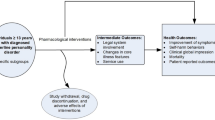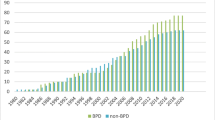Abstract
Psychopharmacology is widely used in the treatment of borderline personality disorder. However, support for this form of treatment has been largely based on case reports, case series, and open-label clinical trials. This evidence-based review examines the most recent randomized controlled trials of psychopharmacology in the treatment of borderline personality disorder, with a goal of highlighting the most promising pharmacotherapy for use in current clinical practice, as well as for future large-scale research testing. The results and limitations of the randomized controlled trial data are presented along with case vignettes illustrating the complexity of the disorder and the heterogeneity of its treatment. To date, there is at least some evidence-based support for the use of antipsychotics (conventional and atypical), monoamine oxidase inhibitors, serotonin reuptake inhibitors, and omega-3 fatty acids in the treatment of borderline personality disorder.
Similar content being viewed by others
Explore related subjects
Discover the latest articles and news from researchers in related subjects, suggested using machine learning.References and Recommended Reading
Gunderson JG, Kolb JE: Discriminating features of borderline patients. Am J Psychiatry 1978, 135:792–796.
American Psychiatric Association: Diagnostic and Statistical Manual of Mental Disorders,edn 4-TR. Washington, DC: American Psychiatric Press, Inc; 2000.
Swartz M, Blazer D, George L, Winfield I: Estimating the prevalence of borderline personality disorder in the community. J Personal Disord 1990, 4:257–272.
Clarkin JF, Widiger TA, Frances A, et al.: Prototypic typology and the borderline personality disorder. J Abnorm Psychol 1983, 92:263–275.
McGlashan TH: The Chestnut Lodge follow-up study, III: long-term outcome of borderline personalities. Arch Gen Psychiatry 1986, 43:20–30.
Comtois KA, Russo J, Snowden M, et al.: Factors associated with high use of public mental health services by persons with borderline personality disorder. Psychiatr Serv 2003, 54:1149–1154.
Hengeveld MW, Rooymans HG, Vecht-van den Bergh R: Psychiatric consultation in a Dutch university hospital: a report on 1814 referrals, compared with a literature review. Gen Hosp Psychiatry 1984, 6:271–279.
Lahmeyer HW, Reynolds CF, III, Kupfer DJ, King R: Biological markers in borderline personality disorder: a review. J Clin Psychiatry 1989, 50:217–225.
Levitt AJ, Joffe AT, Ennis J, et al.: The prevalence of cyclothymia in borderline personality disorder. J Clin Psychiatry 1990, 51:335–339.
Deltito J, Maritn L, Riefkohl J, et al.: Do patients with borderline personality disorder belong to the bipolar spectrum? J Affect Disord 2001, 67:221–228.
Linehan MM, Kanter JW, Comtois KA: Dialectical behavior therapy for borderline personality disorder: efficacy, specificity, and cost-effectiveness. In Psychotherapy: Indications and Outcomes. Washington, DC: American Psychiatric Press; 1999.
Verheul R, Van Den Bosch LM, Koeter MW, et al.: Dialectical behavior therapy for women with borderline personality disorder: 12-month, randomized clinical trial in The Netherlands. Br J Psychiatry 2003, 182:135–140.
Rizvi SL, Linehan MM: Dialectical behavior therapy for personality disorders. Curr Psychiatry Rep 2001, 3:64–69.
Gunderson JG: Borderline Personality Disorder: A Clinical Guide. Washington, DC: American Psychiatric Press; 2001.
DeBattista C, Mueller K: Is electroconvulsive therapy effective for the depressed patient with comorbid borderline personality disorder? J ECT 2001, 17:91–98.
Practice guideline for the treatment of patients with borderline personality disorder. http://www.psych.org/ psych_pract/treatg/pg/borderline_revisebook_index.cfm. Accessed Feb 12, 2004.
Sanderson C, Swenson C, Bohus M: A critique of the American Psychiatric Practice Guideline for the Treatment of Patients with Borderline Personality Disorder. J Personal Disord 2002, 162:122–129.
Goldberg SC, Schulz SC, Schulz PM, et al.: Borderline and schizotypal personality disorders treated with low-dose thiothixene vs placebo. Arch Gen Psychiatry 1986, 43:680–686.
Soloff PH, George A, Nathan RS, et al.: Progress in pharmacotherapy of borderline disorders: a double-blind study of amitriptyline, haloperidol, and placebo. Arch Gen Psychiatry 1986, 43:691–697. This landmark RCT was the first to show efficacy of haloperidol in the treatment of borderline patients. At the same time, it showed lack of efficacy of amitriptyline, putting a moratorium on further RCT research of tricyclic antidepressants in BPD. The efficacy of haloperidol demonstrated in this trial was not replicated in the authors’ subsequent trial [31].
Cowdry RW, Gardner DL: Pharmacotherapy of borderline personality disorder. Arch Gen Psychiatry 1988, 45:111–119.
Frankenburg FR, Zanarini MC: Divalproex sodium treatment of women with borderline personality disorder and bipolar II disorder: a double-blind placebo-controlled pilot study. J Clin Psychiatry 2002, 63:442–446.
De la Fuente JM: A trial of carbamazepine in borderline personality disorder. Eur Neuropsychopharmacol 1994, 4:479–486.
Zanarini MC, Frankenburg FR: Omega-3 fatty acid treatment of women with borderline personality disorder: a doubleblind, placebo-controlled pilot study. Am J Psychiatry 2003, 160:167–169. This is the most recent RCT in the treatment of BPD. It demonstrates efficacy of omega-3 fatty acids, which are a trendy therapy thought to have anti-inflammatory properties; many disciplines in medicine are studying the effects of this naturally occurring compound in a wide variety of disease processes.
Mickleborough TD, Murray RL, Ionescu AA, Lindley MR: Fish oil supplementation reduces severity of exercise-induced bronchoconstriction in elite athletes. Am J Respir Crit Care Med 2003, 168:1181–1189.
Thies F, Garry JM, Yaqoob P, et al.: Association of n-3 polyunsaturated fatty acids with stability of atherosclerotic plaques: a randomized controlled trial. Lancet 2003, 361:477–485.
Zanarini MC, Frankenburg FR: Olanzapine treatment of female borderline personality disorder patients: a doubleblind, placebo-controlled pilot study. J Clin Psychiatry 2001, 62:849–854. This is the first pilot RCT to show efficacy of a low-dose atypical antipsychotic. This medication class is now a mainstay in the symptomatic control of BPD, particularly in patients with cognitiveperceptual distortions.
Frankenburg FR, Zanarini MC: Clozapine treatment of borderline patients: a preliminary study. Compr Psychiatry 1993, 34:402–405.
Salzman C, Wolfson AN, Schatzberg A, et al.: Effect of fluoxetine on anger in symptomatic volunteers with borderline personality disorder. J Clin Psychopharmacology 1995, 15:23–29. This is the first RCT to show the efficacy of an SSRI, now the most widely prescribed class of psychotropic medication in the treatment of BPD.
Rinne T, van den Brink W, Wouters L, van Dyck R: SSRI treatment of borderline personality disorder: a randomized, placebocontrolled clinical trial for female patients with borderline personality disorder. Am J Psychiatry 2002, 159:2048–2054. This RCT is the most recent SSRI trial that uses a larger sample size (albeit in a women-only population) to make positive efficacy claims in the treatment of BPD.
Hollander E, Allen A, Lopez RP, et al.: A preliminary doubleblind, placebo-controlled trial of divalproex sodium in borderline personality disorder. J Clin Psychiatry 2001, 62:199–203.
Soloff PH, Cornelius J, Anselm G, et al.: Efficacy of phenelzine and haloperidol in borderline personality disorder. Arch Gen Psychiatry 1993, 50:377–385. This is the largest RCT in BPD to date. It is arguably the most elegant because of the continuation study phase [32]. Although this study seems to refute the efficacy of haloperidol in BPD, it is important in confirming the efficacy of monoamine oxidase inhibitors at least during the early treatment phase of BPD.
Cornelius JR, Soloff PH, Perel JM, Ulrich RF: Continuation pharmacotherapy of borderline personality disorder with haloperidol and phenelzine. Am J Psychiatry 1993, 150:1843–1848.
Zanarini MC, Frankenburg FR, Khera GS, Bleichmar J: Treatment histories of borderline inpatients. Compr Psychiatry 2001, 42:144–150.
The McLean Center for the Treatment of Borderline Personality Disorder. http://www.mcleanhospital.org/Adult/borderline.html. Accessed February 12, 2004.
Author information
Authors and Affiliations
Rights and permissions
About this article
Cite this article
Raj, Y.P. Psychopharmacology of borderline personality disorder. Curr Psychiatry Rep 6, 225–231 (2004). https://doi.org/10.1007/s11920-004-0068-y
Issue Date:
DOI: https://doi.org/10.1007/s11920-004-0068-y




